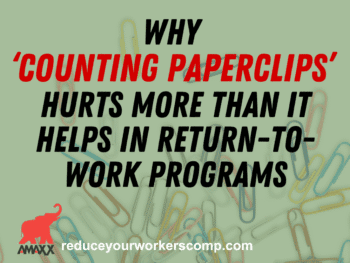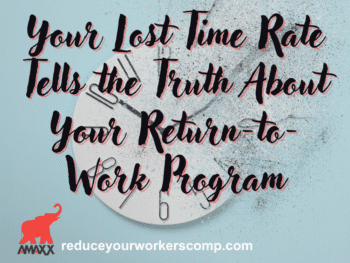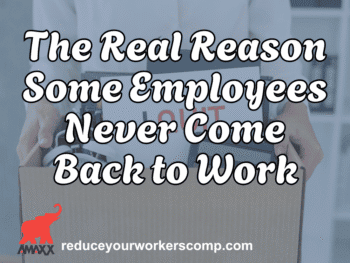Most employers like to think that their workers compensation claims office, whether it is with their workers compensation insurer or with a third party administrator (TPA), has their best interests in mind. In most cases, they do. But, there are areas where the claims office may put their own self interest ahead of the best interest of the customer – you the employer. Here are some of the situations where the claims office does not want you to know what is going on.
- The Bigger the Account, the Better the Service
The claims office, whether a part of the work comp insurer or a part of a third party administrator, is in business to make money. The bigger the client, the more money the claims office receives for handling their claims. While large accounts can have some minor impact on the pricing of claims services, the cost to handle a workers compensation claim is roughly the same regardless of whether it comes from the largest account or the smallest account. Hence, the bigger the account the more important it is to the claims office profit. The management of the claims office will strive harder to provide the level of service needed to keep the big accounts happy. If you are a small or middle-size employer, you are often better off being with a smaller insurer or TPA (better to be the medium size fish in the pond, then to be a minnow in the ocean) that provides boutique service and is willing to customize their services. (WCxKit)
- What Gets Reviewed Gets Done
If you report your workers compensation claim and then forget about it, that is usually okay with the adjusters (however, they do love it when you provide a modified duty return to work program which gets the claims closed faster). But, if you have a program where you check the medical status of each injured employee each month until they are back at work, the adjuster(s) soon learn to be up-to-date on the medical status of each of your employees. If you have a monthly round-table discussion on the progress of your larger claims, the adjuster(s) soon know to be sure the claim keeps moving forward so they can report positive results. If you have an independent Best Practices Audit done every six months or annually, the adjuster(s) learn to comply with your Best Practices requirements.
- We Don’t Like Dedicated Adjusters
One of the best ways to minimize the hiccups and hitches in handling your claims is to have a dedicated adjuster(s) assigned to your account. The dedicated adjuster works only on your work comp claim files and soon knows exactly how you want things done. That is great for you, but it creates some staffing issues for the claims office. The number of claim files – the claim volume – fluctuates in the claims office. When the claim volume increases, they want to spread out the additional claims to all their adjusters so they can get additional income without hiring additional people. However, if you have a dedicated adjuster assigned to your account only, they can not assign the additional new files to “your” dedicated adjuster(s). On the flip side, when claim volume decrease and they have to reduce staff, your dedicated adjuster is harder to terminate, as they do want you to be unhappy and take your claims business elsewhere. It is more cost-effective to provide “designated” rather than “dedicated” adjusters. In many cases, it may serve you better to use the designated adjuster model.
- Our Mistakes Cost You Money
When the claims office provides poor service and the lack of good claim handling skills cause the work comp claim to cost more than it should, the claims office will not call you up and say “sorry, we did a bad job, here is your money back.” Both the frequency and the severity of claims is used to calculate your workers compensation premium. When any aspect of the Best Practices is not done, the result is normally a higher claim payment – severity. That “extra” severity is money out of your pocket with future higher workers compensation premiums.
- We Do Not Like Client Instructions
One of the biggest mistakes the self-insured employer can make is to not have their own set of client instructions. The claims office management will tell you “we have a stringent set of best practices” with the hope that you will let them go their merry way doing things the way they want to do them. When you provide a custom set of client instructions, then the claims office feels a certain amount of pressure to do it your way, especially when you call them on it when they deviate from your client instructions. Your own customized client instructions to do it your way combined with your dedicated adjuster(s) will result in much higher product quality in the claims office.
- We Love Medical Case Management
To keep the claims office profit at the optimum, the claims office management strives to keep every adjuster with a full case load. Sometimes, the full case load gets a bit too full for the adjusters. When the client has a medical case management program, the triage team or the nurse case manager can provide important information to the adjuster without the adjuster having to take time to develop the information her/his self, and RNs provide additional insight into the medical conditions. The saved phone calls to the medical providers, and the time saved coordinating medical care for the employee makes the life of the work comp adjuster a bit easier, but it is not an easy job!
- We Have a Lot of Information We Never Share
As the claims handling world has become computerized (for the most part), a ton of information is now available in the claims management information systems (computers). The insurer or the TPA will usually offer to provide you with the basic loss run. However, with the modern computer systems, you can slice and dice the information just about any way you want. Want to know how many “accidents” are reported on Monday morning? You can a request a computer run by date of loss. Want to know your average number of days of TTD payments? The computers can calculate that. The claims office may not bring you suggestions on how they can provide you with more information, but if you have an information question that can be measured, ask the claims office to share the information with you.
A bi-annual roundtable with your entire claims team (in person, the old-fashioned way) build relationships and provides a forum for adjusters to make suggestions that can improve your workers compensation claims handling program.
Author Rebecca Shafer, JD, President of Amaxx Risks Solutions, Inc. is a national expert in the field of workers compensation. She is a writer, speaker, and website publisher. Her expertise is working with employers to reduce workers compensation costs, and her clients include airlines, healthcare, printing/publishing, pharmaceuticals, retail, hospitality, and manufacturing. See www.LowerWC.com for more information. Contact:RShafer@ReduceYourWorkersComp.com or 860-553-6604.
Our WC Manual: http://corner.advisen.com/partners_wctoolkit_book.html
WORK COMP CALCULATOR: http://www.LowerWC.com/calculator.php
MODIFIED DUTY CALCULATOR: http://www.LowerWC.com/transitional-duty-cost-calculator.php
WC GROUP: http://www.linkedin.com/groups?homeNewMember=&gid=1922050/
SUBSCRIBE: Workers Comp Resource Center Newsletter
Do not use this information without independent verification. All state laws vary. You should consult with your insurance broker or agent about workers comp issues.
©2011 Amaxx Risk Solutions, Inc. All rights reserved under International Copyright Law. If you would like permission to reprint this material, contact Info@ReduceYourWorkersComp.com



























